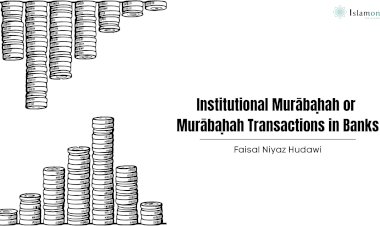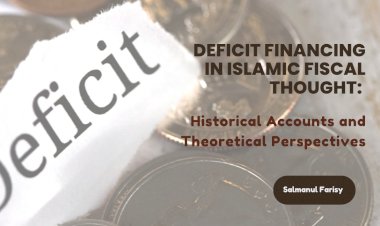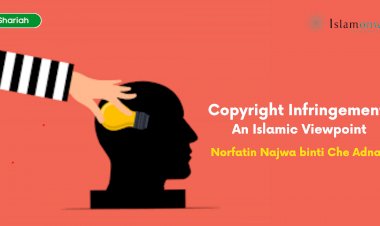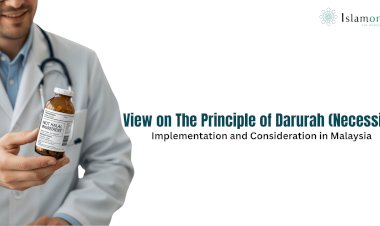Life in the Era of Pandemic: A Fiqhī Framework
Introduction
Covid-19 is still around us but with more furious nature despite the strict use of various methods and efforts to combat it, only to know that it is more powerful. How life should be in this era of the pandemic? How should we wisely plan our lives and future? Are there any principles or maxims in Islamic jurisprudence that help us decide our action and inaction? How to balance our faith, health and wealth? These are some common questions that float in our minds for the last many days.
In the light of the above questions, the author would like to pick one Islamic legal maxim (al-qāʿidah al-fiqhiyyah), that is “harm should neither be inflicted nor reciprocated” (lā ḍarar’ wa lā ‘ḍirār’) and place it in our current situation. Technically, legal maxim means “a comprehensive principle that is applicable to all of its particulars” (al-Jurjānī 1983, 171). The other wording of this maxim is “harm must be eliminated”. In order to derive principles of social ethics and interpersonal relationships, and for deducing legal rules on modern issues, this maxim is widely used.
Covid-19 is a source of several harms, including private and public, and material and mental. As a result, the maxim of “no harm” has become particularly significant in the context of the pandemic. Therefore, this article tries to approach this pandemic placing under the spectrum of Islamic legal maxims related to the elimination of harm.
We can categorize maxims related to harm elimination into three types. First, maxims relevant to the prevention of harms before their occurrence are:
(1) “no harm shall be inflicted nor reciprocated” (lā ḍarar wa lā ḍirār)
(2) “harm should be avoided as much as possible” (al-Ḍarar Yudfaʿ bi Qadr al-Imkān)
(3) “repelling evils is preferable over attaining benefits” (dar’ al-mafāsid awlā min jalb al-maṣāliḥ).
Second, maxims relevant to the elimination of harms after their occurrence are:
(1) “harm must be eliminated” (al-ḍarar yuzāl)
(2) “harm is not repelled by its alike” (al-ḍarar lā yuzāl bi mithlihi)
(3) “lapse of time cannot justify continuation of harm” (al-ḍarar lā yakūnu qadīman).
Third, maxims relevant to the minimization of harms are:
(1) “the greater harm should be prevented by forbearing the lesser harm” (al-Ḍarar al-ashadd yudfaʿ bi al-ḍarar al-Akhaff)
(2) “personal injury should be tolerated to prevent general injury” (yutahammal al-ḍarar al-Khāṣṣ li al-dafʿ al-ḍarar al-ʿāmm).
How these Maxims can be placed in Pandemic Era
Utilizing the Islamic legal maxims related harm eliminations; an action plan to set our life in the era Covid-19 is streamlined below. This action plan is prepared in conformity with the WHO and medical experts' guidelines in this regard, but having placed them under the gamut of fiqh principles.
Step 1: Identification of a considerable harm
Firstly, as wise and adult human beings, our duty is to find out what are the major types of harms posed by pandemic. In fiqh, action or inaction is called considerable harm if it meets four criteria which are (1) reality (2) seriousness (3) illegitimate way of infliction and (4) damage to valid benefit. (Ḥaydar 1991, 1: 73; al-Mawāq 1994, 5: 165; Mawāfī 804; al-ʿAdwiyy 6: 1)
So, any non-compliance with Covid-19 containment measures is considerable harm. It includes breaking the rules of quarantine, lockdown and other Covid-19 protocols, visiting Covid-19 patients, unnecessary travelling, going to the crowd and so on.
The command of harm elimination falls in the category of the obligatory (wājib), and it is realized by its prevention before its occurrence and by its elimination after its occurrence. In addition, all deliberate interactions that cause infecting or spreading of this disease are deemed prohibited (ḥarām) from fiqh perspective. As a result, involvement or/and participation in the containment measures of this disease is not only abiding by government regulations but also an adhering to religious binding for that he will be rewarded and punished if they did otherwise.
Step 2: Prioritization of containment measures
After identifying considerable harm, next duty is to make the arrangements of harm elimination according to the appropriate hierarchy, which is as follows, first: prevention, second: elimination and third: minimization. Of the three types, preference is always given to the prevention of harms before their occurrence because it prevents any ramifications of the infliction of harm and is in line with the widely recognized principle of ‘prevention is better than cure’.
Step 3: Prevention Phase
Three above-mentioned maxims related to prevention must be in the hearts of agents for making effects in this phase.
The primary step in preventing the infection is knowing how it spreads; then only people can stay away from the causes. The health experts have advised several measures to reduce chances of being infected or spreading Covid-19. In order to kill the viruses on hands, washing hands and avoiding the touching eyes, nose, and mouth are the primary methods in the precaution. For staying away from small liquid droplets from the patients’ nose or mouth which may contain virus, social distancing and not coming together in crowds, wearing fabric masks are also very important. Following good respiratory hygiene (covering mouth and nose during coughing and sneezing), is another method for reducing transmission of virus. Staying home and self-isolating are important that limit human-to-human transmission including reducing secondary infections among close contacts and health care workers and going out should be only for meeting the necessary situation.
The effective system for identification of patients and providing optimized care is very crucial. Making follow up of the contacts, health measures of travellers and mass awareness programmes via online platforms can also play a pivotal role in the prevention phase. In addition, scientific research for accelerating treatment options for developing diagnostics, therapeutics and vaccines is also part of prevention.
These days, while Covid-19 poses more threatening questions to the human existence on the earth, vaccination appears to be one of the most important measures in the prevention stage.
Step 4: Elimination Stage
Harm is eliminated by either removing it completely or reducing its effects or stopping the chances of repetition of the same harm. Once harm occurred, its removal and repair of problems are obligatory because harm is mischief and to allow its continuance is another mischief (Muhsin et al. 2019). Usually, the harm is eliminated by removal of harmful material, tort liability and legal punishments. These three methods are important in the case of Covid-19, undoubtedly. In this stage, three above mentioned maxims related elimination of harm should be governing the acts.
Self-care and treatment are among the best methods for elimination of Covid-19. Having proper rest, maintaining hygiene, drinking plenty of fluid, and eating nutritious food are important. As part of elimination, the most important aspect is avoiding infecting others. For that, staying in one place in the home, using a separate bedroom and bathroom, informing others about infection so they keep their distance, covering coughs and sneezes with a tissue or elbow, wearing a mask over nose and mouth, washing hands regularly, not sharing dishes, cups, eating utensils, towels, or bedding with anyone else and disinfecting common surfaces like doorknobs, counters, and table-tops are crucial.
In addition, if a Covid-19 patient deliberately or carelessly causes infection to others, he must be punished with compensation and imposing liability. The Quran says, “Therefore, if anyone transgresses a prohibition by attacking you, you may do likewise” (al-Baqarah: 194).
Step 5: Minimization Methods of Unavoidable Covid-19 Consequences
At the face of eliminating harm, time and again various situations appear where harm originates while eliminating existing harm or harm is eliminated, only leaving some portions unsolved. In those situations, maxims related to the minimization of harm should be used.
As per these maxims, a person has freedom of choice if he is forced to choose one from two or more mutually exclusive equal harms. However, if the harms are unequal in terms of their severity, then committing the lesser harm is legally allowed, but it is religious binding in order to prevent the occurrence of greater harm. Therefore, discussing from a maqasidic perspective, in order to prevent harm to the needs (ḥāajiyyāt category) and the essentials (ḍarūriyyāt category), harm to the embellishments (taḥsīniyyāt category in the maqāṣid) are tolerated. Similarly, harm to the ḥāajiyyāt is tolerated in order to prevent harm to the ḍarūriyyāt. For preventing that which is prohibited, (ḥarām) discouraged (karāhat) is permitted. In addition, Islam gives added importance to the aspect of protecting the best interests of the public even at times tolerating harm to the private. Public means the wider community or a large group of people while private refers to a single individual or a small group of people.
References
Al-Jurjānī, Al-Sharīf. 1983. al-Taʿrīfāt. Beirut: Dār al-Kutub al-ʿIlmiyyah.
Al-Haytamī, Ibn Ḥajar. 1397 AH. Fatḥ al-Mubīn li Sharḥ al-Arbaʿīn. Beirut: Dār al-Kutub al-ʿIlmiyyah.
Mawāfī, Aḥmad. 1997. Al-Ḍarar fī al-Fiqh al-Islāmī: Taʿrīfuhu, Anwāʿuhu ʿAlāqātuhu, Ḍawābituhu, Jazā’uhu. Saudi Arabia: Dār Ibn ʿAffān li al-Nahsr wa al-Tawzīʿ.
Al-Subkī, Tāj al-Dīn. 1991. Al-Ashbāh wa al-Naẓā’ir. Beirut: Dār al-Kutub al-ʿIlmiyyah.
Ibn Nujaym, Zayn al-Dīn. 1405 AH. al-Ashbāh wa al-Naẓā’ir .Damascus: Dār al-Fikr.
Al-Zarqā, Mustafa Ahmad. 1983. Al-Madkhal al-Fiqhī al-ʿᾹmm (7th edn). Damascus: Matbaʿah Jamiʿah.
Al-Būrnū, Muḥammad Ṣidqī. 1996. al-Wajīz fī Īḍāḥ al-Qawāʿid al-Fiqhiyyah (2nd and 4th edn.). Beirut: Mu’assasat al-Risālah.
Suyūṭī, Jalāl al-Dīn. 1983. Al-Ashbāh wal-Naẓā’ir. Beirut: Dār al-Kutub al-ʿIlmiyyah.
Al-Qarāfī, Shihāb al-Dīn. n.d. Anwār al-Burūq fī Anwā’ al-Furūq. Muḥammad Rawās Qalʿajī (Ed.). Beirut: Dār al-Maʿrifah.
(Sayyed Mohamed Muhsin is Assistant Professor, Department of Fiqh and Usul al-Fiqh, International Islamic University Malaysia, Kuala Lumpur)
Disclaimer
The views expressed in this article are the author’s own and do not necessarily mirror Islamonweb’s editorial stance.
























Leave A Comment